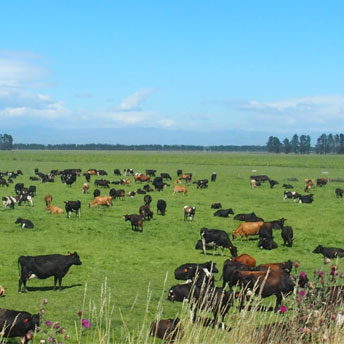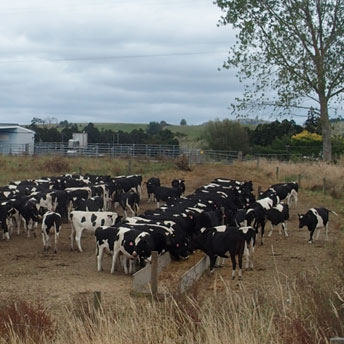NZ has a very varied economy ranging from agriculture, forestry, mining manufacturing and tourism to name a few.
The Gross Domestic Product (GDP) from agricultue is about 5% (UK about 0.5%).
Agriculture is export driven 95% of Dairy products (milk powder, cheese, butter) 94% of lamb, 87% of beef, 90% of wool is exported to large overseas markets with the expanding markets of the Far East and China absorbing a lot of these.
Population of NZ is 4.5 m compared to UK 65m
Dairy Cows NZ 6.4m | Herd Size 419 | Average Yield 4,230 litres
Dairy Cows UK 1.9m | Herd size 133 | Average Yield 7,900 litres
70% of dairy farms are in the N Island
Nearly all cows are spring calving (June - Sept) a few herds in N Island autumn calve (March/April)
Sheep NZ 28m in 1982 it was 70m!
UK 12.5m
Beef NZ 3.7m
UK 4.2m
Post Brexit is a challenge to all farmers, European style subsidies are being phased out and replaced with payments to conserve the environment and not for food production. NZ had a similar situation in 1984 when subsidies were removed virtually overnight. Despite dire predictions there was no mass exodus from the land, just a tough transition and only 1% of farmers left the land. NZ are now a powerhouse when it comes to agricultural production on the world stage.
Cows live outside all year due to a milder climate and very free draining land. Although grass is the predominant feed, maize, fodderbeet, plantain, turnips are all grown to supplement production in lean times. Concentrate nuts are almost unheard of, some PK (Palm Kernel) is sometimes fed.



The Environment
Agriculture faces many challenges over the next decade, one that is coming to the forefront is greenhouse gas emissions and the part played by livestock.
Transport and agriculture have played a significant role in global warming, figures are easy to come by, accurate and reliable figures are not. Livestock contribution to greenhouse gas emissions including carbon dioxide, methane and nitrous oxide are put at about 18% of the total, there have been counter arguments in the UK putting this figure at nearer 8%. Much more research is needed, whatever the outcome it cannot be ignored.
NZ have reacted positively by setting up the NZ Emissions Trading Scheme, among other recommendations and stipulations agriculture must monitor and report their emissions. The main offset to the increase in gasses will be in the planting of trees. Whereas in the early 2000's a lot of land was converted from forestry to dairy this has now completely stopped.
We as trustees are all involved in agriculture or the food industry and as such will be expecting all recipients of this scholarship to be aware of environmental implications of agriculture and to actively seek out pertinent information and best practice whilst in NZ, especially that appertaining to the dairy industry.
